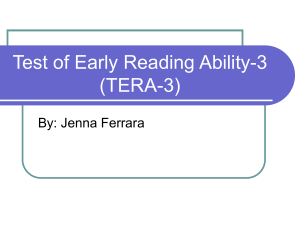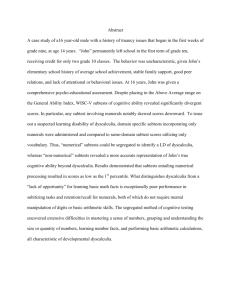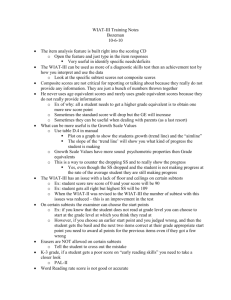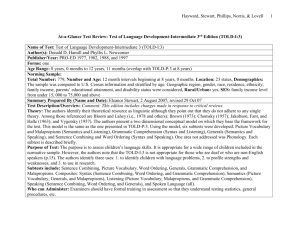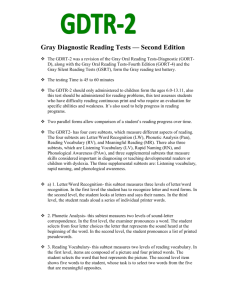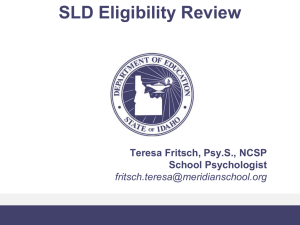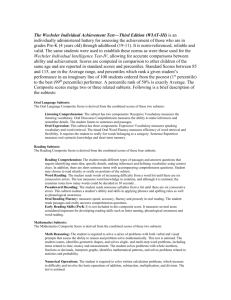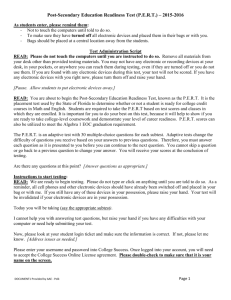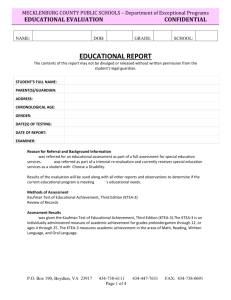Special Education: Testing - | Missouri Legal Aid Programs
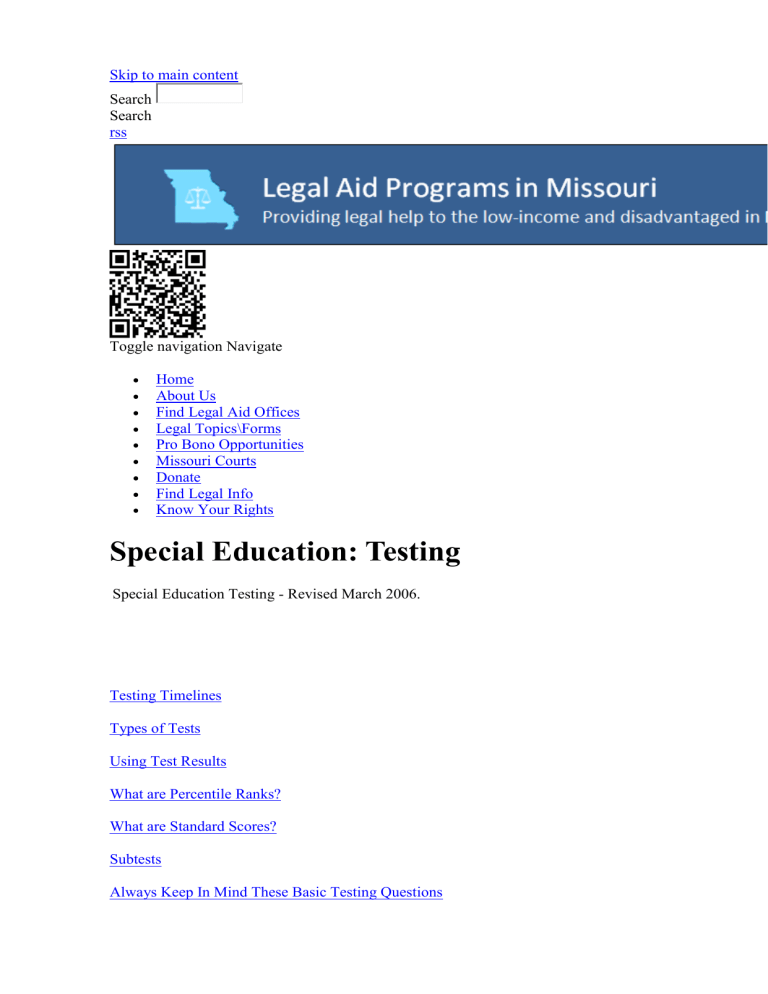
Skip to main content
Search
Search rss
Toggle navigation Navigate
Home
About Us
Find Legal Aid Offices
Legal Topics\Forms
Pro Bono Opportunities
Missouri Courts
Donate
Find Legal Info
Know Your Rights
Special Education: Testing
Special Education Testing - Revised March 2006.
Always Keep In Mind These Basic Testing Questions
If your child is a special education student, or you think they need to be tested for special education, it is important that you understand the testing process.
Your child will probably be tested several times while he or she is at school. The results of these tests will be used to decide whether your child should have special education, what types of services your child needs, and whether your child is making reasonable progress in school.
When done properly, testing can help tell a child’s strengths and weaknesses. Test results can help explain why your child is having difficulty in class. The tests may also suggest ways to help your child learn.
Testing Timelines
If either you or an IEP team request testing of your child, there are timelines that must be followed.
The school district has a maximum of thirty days to get “parental consent” to do the testing.
Once the school district gets your consent, they have sixty days to finish the testing and hold a meeting.
This meeting is called an “eligibility conference.” At the eligibility conference, the person who did the testing of your child will go over the results. It is very important that you go to this meeting! The eligibility conference is where the decision is made about whether your child has a disability and needs special education.
Parents must be given notice of the eligibility conference and an opportunity to be present and participate. You are also allowed to bring other people to the meeting who know about your child’s needs (family members, social workers, etc.).
Refusing Testing
If you refuse to consent to testing, the school district has a choice about what to do. If the district feels strongly about having your child tested, they can file a due process complaint and ask for permission to do testing over your objection. On the other hand, they can choose to honor your refusal and do no testing. If the district honors your decision not to do testing, you usually cannot come back later and complain that the school district discriminated against your child because of a disability.
Re-Evaluations
Once your child has been identified as a special education student, she must be re-tested in certain circumstances. The district is required to conduct a re-evaluation if you or the teacher request one or if the school district feels that a re-evaluation is necessary due to changes in your child’s academic achievement and functional performance.
At a minimum, testing must be completed at least every three years—unless you and the school district agree that re-testing is not necessary. However, the district is not obligated to test your child more than once a year. Finally, a school district must re-evaluate your child before finding that she no longer qualifies for special education services.
School districts are supposed to get your consent for re-evaluations. However, unlike the consent requirement for an initial evaluation, school districts can go forward with a re-evaluation even without your consent if the district can show that it tried to get your consent and you failed to respond.
Types of Tests
The law requires school districts to use a variety of assessment tools and strategies to gather relevant functional, developmental and academic information. They can not use one single measure or assessment as the sole reason for identifying or denying your child as entitled to special education services. The district can only use tests for the purposes which the tests are valid and reliable.
Educational, counseling and medical professionals can choose from hundreds of tests. These tests fall into six basic categories:
§
Intellectual or Cognitive Tests
. These tests are often called “I.Q.” tests. They measure your child’s ability to learn.
§
Speech and Language Tests
. Speech tests measure your child’s ability to actually form words and make the proper speech sounds. Language tests measure your child’s ability to communicate with other people.
§
Educational Achievement . These tests measure what your child has actually learned.
§
Personality Tests
. These tests give information about your child’s level of stress, anxiety, and overall mental state.
§ Neuropsychological Tests . These are tests help to find out if your child has a physical problem that make learning hard.
§ Behavior Rating Scales . These scales describe a child’s behavior. These descriptions of behavior can be completed by the child, parents, teachers or others close to the child.
Using Test Results
Understanding the tests results is not easy. Each test has its own technical terms. Ask for an explanation of each term that is new to you. Ask why the test was chosen and whether other tests were considered. At any meeting where the test results are discussed, the school must have someone there who is knowledgeable and can explain what the test results mean to you.
Caution: Always ask questions until you are sure you understand the tests given to your child, the reasons for the tests, the results of the tests, and the meaning of the test results.
You know your child and his or her problems best. Think about how the test was given. Was the child asked the questions? Did the child have to read the questions? Did the child give the answers by speaking or by writing? Did your child’s problems get in the way of taking or answering the test? If you think so, tell the school’s staff your concerns.
Each test usually has lots of numbers. Ask for an explanation of what the numbers mean. In most test results, the numbers compare your child to others of the same age or grade. For example, your child’s math score may be at the 3rd grade level, or her physical development may be at the age 6 level. Ask what these scores mean.
What are Percentile Ranks?
Test results are also often given in “Percentile Rank.” This is often abbreviated as “PR.” The percentile rank tells where the child’s test score compares to other kids. For instance, a PR of 50-
-out of a total of 100--means that half the children scored higher and half of the children scored lower than your child. A PR of 32 means that 68% of children did better than your child and
32% did the same as your child or worse. A PR of 2 means that 98% of kids did better and your child was in the bottom 2%.
Ask what these percentile ranks tell about your child’s educational problems.
What are Standard Scores?
Test results are often given as “standard scores.” For example, you may be told that your child
“scored” 85 on the IQ test. Is this a good score or not? The number 85 tells you, the parent, very little. Ask what it means. Ask how many kids did better than that. Ask how this test result compares with your child’s other test results. For instance, if your child’s IQ test result is much higher than his or her achievement test results, this may indicate a learning disability.
Subtests
It is also important to know that scores are often the result of a number of “subtests.” These subtests measure different things that are included in the subject being tested. For example, your child may have their reading tested. The reading test may be made up of several subtests.
One subtest might look at how many mistakes your child made when reading something out loud. Another subtest might measure your child’s ability to understand what she is reading. The test results of these and other subtests will be combine
Make sure that the person who did the testing goes over the subtests with you so you understand your child’s strengths and weaknesses. Ask if the subtest scores are very different from one another or if any subtest scores are very different from the total combined score. For instance, one subtest may be way above average and another way below average. Ask why this might occur. Can this information be used to explain your child’s school problems?
Always Keep In Mind These Basic Testing Questions
§ Do the test results help explain why your child is having difficulty in school?
§Do the test results help you and the school understand why your child is having trouble learning new skills?
§ Do the tests results suggest methods that would help your child learn? Which of your child’s problems are most important? Which needs should be addressed first?
§As the child goes through school, use tests and test results to measure progress. Whenever possible, an IEP’s goals and benchmarks should be measurable and objective. That is, progress toward a goal should be able to be tested. Ask which tests will be used to measure progress.
§ As time goes on, your child will have test results that go back one or more years. Review the test results as they change over time. Is your child making progress? Have grade and age equivalent scores shown improvement? Over the course of a year, have the scores shown a year’s improvement? For example, if a year ago your child was at a fifth grade math level, after a year of special education has the child’s sores improved so that he or she is now at a sixth grade level? If not, more services may be needed.
§ By skillfully using test results, experience, and personal knowledge, the IEP team should be able to write an educational plan specific to the needs of your child. You can help in this process by asking questions to make sure you understand the tests (and the test results).
More Information on the Web
This discussion owes much to From Emotions to Advocacy by Peter and Pam Wright, who have a web site with a number of useful resources .
Notice
Prepared by Missouri legal aid lawyers. Some material used with permission of Pine Tree Legal
Assistance. March, 2006.
Sometimes the laws change. We cannot promise that this information is always up-to-date and correct. If the date above is not this year, call us to see if there is an update.
We provide this information as a public service. It is not legal advice. By sending you this information, we are not acting as your lawyer. Always consult a lawyer, if you can, before taking legal action.
Sorry, but we cannot respond to website requests for help. If you believe you have a legal problem we can help yo
Scan o
Mission
Our mission is to improve access to justice in civil matters to the clients we serve through quality representation.
Find Legal Help
Find an office where you can apply to get help from a legal aid program.
Find Nearest Office
LSC’s support for this website is limited to those activities that are consistent with LSC restrictions. LSC funded programs in Missouri participate in this website consistent with LSC restrictions
Legal Disclaimer
Privacy Policy
Terms Of Use
Login
Printed: February 5, 2016 http://www.lsmo.org/node/516/Special%20Ed.%20Rights(2.8).doc
© 2016 Legal Aid Programs in Missouri
Powered by OpenAdvocate
